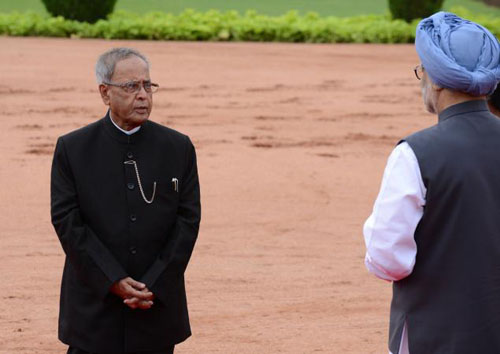
New Delhi, September 22: Amid intense speculation of a Cabinet reshuffle, Prime Minister Manmohan Singh today met President Pranab Mukherjee during which the two discussed the political situation in the country.
The meeting lasted for 45 minutes during which the two leaders discussed the "current political situation", Rashtrapati Bhavan spokesperson Venu Rajamony said here.
The meeting comes a day after the 19-member Trinamool Congress gave a letter to the President announcing withdrawal of support to the Congress-led UPA government.
Both the government and the Congress have maintained that with the outside support of 43 MPs from the SP and the BSP, the ruling coalition has a strength of over 300 in the 545-member Lok Sabha, which is well above the halfway mark of 273.
Singh's meeting with Mukherjee also takes place against the backdrop of his strong defence of FDI and hike in diesel price.
The decisions have been attacked by allies, the NDA and the Left parties.
Explaining the rationale behind the decisions, Singh, in a televised address to the nation, had said if this was not done, the fiscal deficit would have shot up resulting in price rise and more hardships for the common man.
Today's meeting comes amid speculation of a Cabinet reshuffle in the wake of vacancies caused by the departure of Trinamool ministers as also some ministers holding more than one portfolio.
An official announcement said Union minister C P Joshi has been given additional charge of Railways held by Mukul Roy of Trinamool Congress. This is seen as a stop gap arrangement ahead of significant changes in the Council of Ministers.
President Mukherjee is scheduled to leave on a three-day visit to Jammu and Kashmir on September 26.




Comments
Add new comment